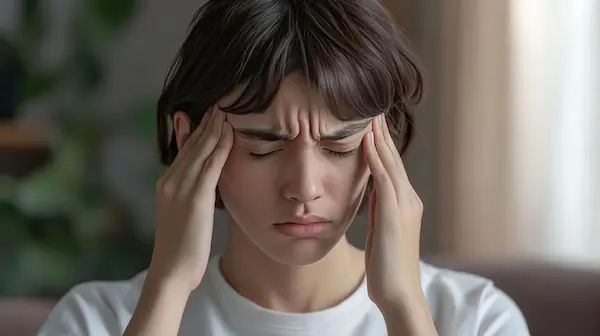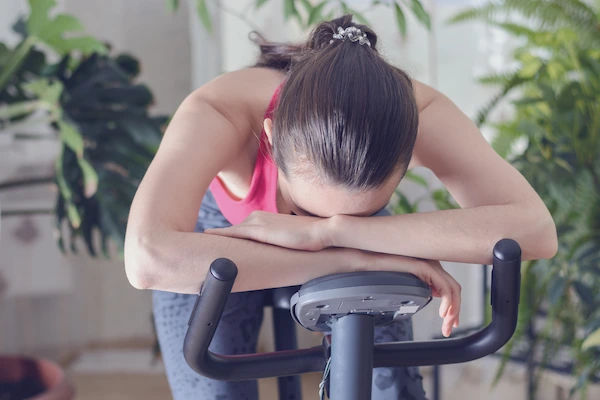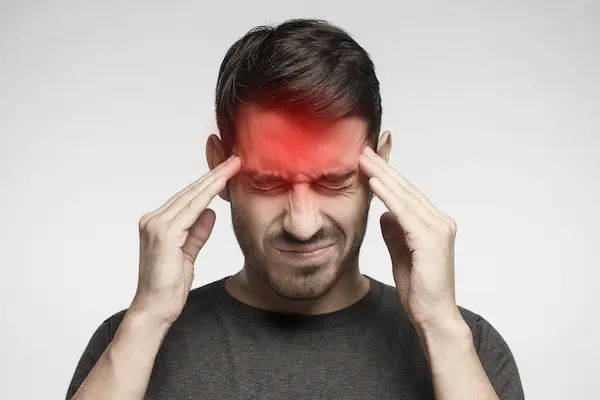Headache Prevention: Your Guide to Causes and Lasting Relief
Discover effective ways to prevent headaches, understand common causes and triggers, and find lasting relief through lifestyle changes and professional guidance.

.webp?tr=q-80,f-webp,w-350,dpr-2,c-at_max 700w)
Introduction
That familiar, throbbing, or pressing pain in your head—a headache is an almost universal human experience. While often dismissed as a minor nuisance, frequent headaches can significantly disrupt your life, productivity, and overall well-being. But what if you could break the cycle? Understanding what leads to headaches is the first and most crucial step towards effective preventions. This comprehensive guide will move beyond just listing symptoms. We will delve into the "why" behind the pain, explore the different types of headaches, and provide you with an actionable, evidence-based blueprint for prevention. From simple lifestyle tweaks to understanding when it's time to seek professional help, we aim to empower you with the knowledge to take control of your head health and find lasting relief.
Understanding the Different Types of Headaches
Not all headaches are created equal. Medically, they are categorised into two main groups: primary and secondary. Knowing which type you're dealing with is fundamental to choosing the right prevention strategy.
Primary Headaches: When the Headache Is the Condition
Primary headaches are standalone illnesses caused by overactivity of or problems with pain-sensitive structures in your head. They are not a symptom of an underlying disease.
Tension-Type Headaches: The Most Common Culprit
Often described as a tight band around the forehead or a constant, dull ache on both sides of the head, tension-type headaches are the most prevalent. The pain is usually mild to moderate and isn't typically aggravated by physical activity. The exact cause isn't fully understood, but they are strongly linked to muscle tension in the neck and scalp, often triggered by stress, poor posture, or skipped meals.
Migraine Headaches: More Than Just a Bad Headache
Migraines are a neurological condition characterised by recurrent, often debilitating attacks. The pain is usually a moderate to severe throbbing or pulsating sensation, frequently on one side of the head. Symptoms often include nausea, vomiting, and extreme sensitivity to light (photophobia) and sound (phonophobia). Some people experience an "aura" before the pain begins—visual disturbances like flashing lights or zigzag lines. Common migraine triggers include hormonal changes, specific foods, bright lights, and changes in sleep patterns.
Cluster Headaches: The "Suicide Headaches"
Although rare, cluster headaches are exceptionally severe and painful. They occur in cyclical patterns, or "clusters," with multiple headaches happening each day for weeks or months, followed by a remission period. The pain is excruciating, typically focused around one eye, and can cause eye redness, tearing, and nasal congestion on the affected side. They are more common in men and often wake people from sleep.
Secondary Headaches: A Symptom of an Underlying Issue
Secondary headaches are a symptom of an underlying health condition that activates the pain-sensitive nerves of the head. The causes can range from relatively minor to serious. Examples include:
- Sinus headaches: From sinus infections or allergies.
- Dehydration headaches: From not drinking enough fluids.
- Medication-overuse headaches: Caused by the frequent use of pain-relief medication.
- Caffeine withdrawal headaches.
- More serious causes like head injury, blood clots, or, in rare cases, tumours.
The Primary Causes and Triggers of Headaches
Identifying your personal triggers is perhaps the most powerful tool for preventing headaches naturally. Triggers are highly individual, but they generally fall into a few categories.
Lifestyle and Environmental Triggers
Your daily habits and environment play a massive role. Common triggers include:
- Sleep: Both lack of sleep and oversleeping can trigger migraines and tension headaches.
- Poor Posture: Slouching at a desk, hunching over a phone, or an awkward sleeping position strains neck and shoulder muscles, leading to tension headaches.
- Bright Lights, Loud Noises, and Strong Smells: These are classic migraine triggers for many.
- Weather Changes: Shifts in barometric pressure, extreme heat, or high humidity can prompt a headache.
Dietary Triggers You Might Be Overlooking
What you eat and drink has a direct impact. Key dietary triggers include:
- Alcohol (especially red wine) and Caffeine: Both consumption and withdrawal are common triggers.
- Aged Cheeses and Processed Meats: Contain tyramine and nitrates, known migraine triggers.
- Artificial Sweeteners (like aspartame) and MSG.
- Skipped Meals: Fasting or low blood sugar is a potent trigger for many.
The Role of Stress and Posture
Stress is the number one trigger for tension-type headaches and a major player for migraines. It causes muscles to tense up and can alter the levels of certain chemicals in the brain. Similarly, poor posture, especially the "text neck" posture from looking down at devices, places immense strain on the cervical spine, a primary source of headache and neck pain.
Consult an Specialist for the best advice
Proactive Strategies: How to Prevent Headaches Naturally
Prevention is always better than cure. By adopting a proactive approach, you can significantly reduce the frequency and intensity of your headaches.
Master Your Triggers: The Headache Diary
The single most effective step is to keep a headache diary. For a few weeks, note down:
- When the headache started and ended.
- What the pain felt like and where it was located.
- What you ate and drank 24 hours before.
- Your sleep pattern and stress levels.
- Any medications you took.
- This log will help you and your doctor identify clear patterns and your unique triggers.
Lifestyle Modifications for Lasting Relief
Hydration and Nutrition: Fuelling Your Body Right
Aim to drink at least 8 glasses of water throughout the day. Eat regular, balanced meals to maintain stable blood sugar. Based on your headache diary, try to eliminate suspected dietary triggers for a few weeks to see if it makes a difference.
Sleep Hygiene: The Foundation of Headache Prevention
Stick to a consistent sleep schedule, even on weekends. Create a restful environment: dark, quiet, and cool. Avoid screens for at least an hour before bed. Most adults need 7-9 hours of quality sleep per night.
Exercise and Stress Management Techniques
Regular, moderate aerobic exercise (like brisk walking, swimming, or cycling) for 30 minutes most days can reduce the frequency and severity of headaches by improving blood flow and reducing stress. Incorporate stress management practices such as:
- Deep Breathing Exercises: 5-10 minutes of focused breathing can calm the nervous system.
- Meditation and Mindfulness: Apps can guide you through short sessions.
- Yoga or Tai Chi: Combine gentle movement with breathwork.
- Biofeedback: A technique where you learn to control bodily processes like heart rate to reduce tension.
When Home Care Isn't Enough: Medical Prevention and Treatment
If your headaches are severe, frequent, or don't respond to lifestyle changes, it's crucial to seek professional help. If your condition does not improve after trying these methods, book a physical visit to a doctor with Apollo24|7. A doctor can provide a definitive diagnosis and may recommend:
- Preventive Medications: These are taken daily to reduce the frequency and severity of headaches, especially migraines and chronic tension headaches.
- Physical Therapy: Can be excellent for headaches caused by neck problems and poor posture.
- Identifying Underlying Causes: A doctor can rule out or treat any secondary causes for your headaches.
Quick Takeaways: Key Points for Headache Prevention
- Identify Your Triggers: Keep a detailed headache diary to find your personal triggers (food, stress, sleep, etc.).
- Stay Hydrated: Dehydration is a common and easily preventable cause of headaches.
- Prioritise Sleep: Maintain a consistent sleep schedule for 7-9 hours per night.
- Manage Stress: Incorporate daily practices like exercise, meditation, or deep breathing.
- Mind Your Posture: Avoid slouching and "text neck" to prevent tension headaches.
- Eat Regularly: Don't skip meals to avoid blood sugar crashes that can trigger headaches.
- Know When to Seek Help: Consult a doctor for sudden, severe headaches or if your pattern changes.
Conclusion
Headaches, while common, don't have to be a regular part of your life. By understanding the different types of headaches—from the common tension-type to the debilitating migraine—you can begin to decode the messages your body is sending. The journey to headache prevention is deeply personal, rooted in identifying your unique triggers through a headache diary and committing to sustainable lifestyle changes. Prioritising hydration, consistent sleep, stress management, and proper posture forms a powerful foundation for resilience. Remember, you are the best advocate for your health. If your headaches persist, become more severe, or you notice any neurological symptoms like numbness or confusion, do not hesitate to seek professional guidance. If symptoms persist beyond two weeks, consult a doctor online with Apollo24|7 for further evaluation. Taking a proactive and informed approach empowers you to break the cycle of pain and reclaim your days.
Consult an Specialist for the best advice
Consult an Specialist for the best advice

Dr. Mainak Baksi
General Practitioner
13 Years • MBBS , MD (MPH)
Howrah
Mainak Baksi Clinic, Howrah
(50+ Patients)

Dr. Rajib Ghose
General Physician/ Internal Medicine Specialist
25 Years • MBBS
East Midnapore
VIVEKANANDA SEBA SADAN, East Midnapore

Dr. Dhankecha Mayank
General Practitioner
6 Years • MBBS
Hyderabad
Apollo 24|7 Clinic - Telangana, Hyderabad

Dr. Md Yusuf Shareef
General Practitioner
8 Years • MBBS
Hyderabad
Apollo 24|7 Clinic, Hyderabad

Dr. Mohammed Kamran
General Practitioner
5 Years • MBBS, FIDM
Nashik
Apollo 24|7 Clinic - Maharashtra, Nashik
Consult an Specialist for the best advice

Dr. Mainak Baksi
General Practitioner
13 Years • MBBS , MD (MPH)
Howrah
Mainak Baksi Clinic, Howrah
(50+ Patients)

Dr. Rajib Ghose
General Physician/ Internal Medicine Specialist
25 Years • MBBS
East Midnapore
VIVEKANANDA SEBA SADAN, East Midnapore

Dr. Dhankecha Mayank
General Practitioner
6 Years • MBBS
Hyderabad
Apollo 24|7 Clinic - Telangana, Hyderabad

Dr. Md Yusuf Shareef
General Practitioner
8 Years • MBBS
Hyderabad
Apollo 24|7 Clinic, Hyderabad

Dr. Mohammed Kamran
General Practitioner
5 Years • MBBS, FIDM
Nashik
Apollo 24|7 Clinic - Maharashtra, Nashik
More articles from Headache
Frequently Asked Questions
What is the fastest way to get rid of a headache without medicine?
Apply a cold compress to your forehead or temples for tension headaches, or a warm compress to the back of your neck. Sit in a quiet, dark room, drink a large glass of water, try gentle neck stretches, or massage your temples.
Can dehydration cause headaches every day?
Yes, chronic mild dehydration is a very common cause of daily, low-grade tension-type headaches. Ensuring you drink enough water throughout the day is one of the simplest and most effective preventions for headaches.
When should I be worried about a headache?
Seek immediate medical attention if a headache is sudden and explosive ('thunderclap' headache), is accompanied by a fever, stiff neck, confusion, seizure, or double vision, or if it follows a head injury. These can be signs of a serious underlying condition.
What is a caffeine headache and how can I prevent it?
A caffeine headache is a withdrawal symptom that occurs when your body is dependent on caffeine and you miss your usual dose. To prevent it, avoid consuming large amounts regularly. If you want to quit, taper off your intake slowly over several days rather than stopping abruptly.
Are there any specific tests to diagnose headache types?
There is no single test. Diagnosis is primarily based on your medical history and a description of your symptoms. In some cases, especially to rule out secondary causes, a doctor may order imaging tests like an MRI or CT scan. Apollo24|7 offers convenient home collection for routine blood tests that can help rule out other issues like vitamin deficiencies that may contribute to headaches.




